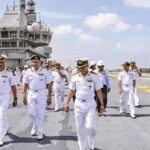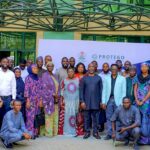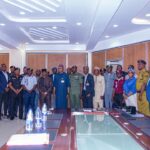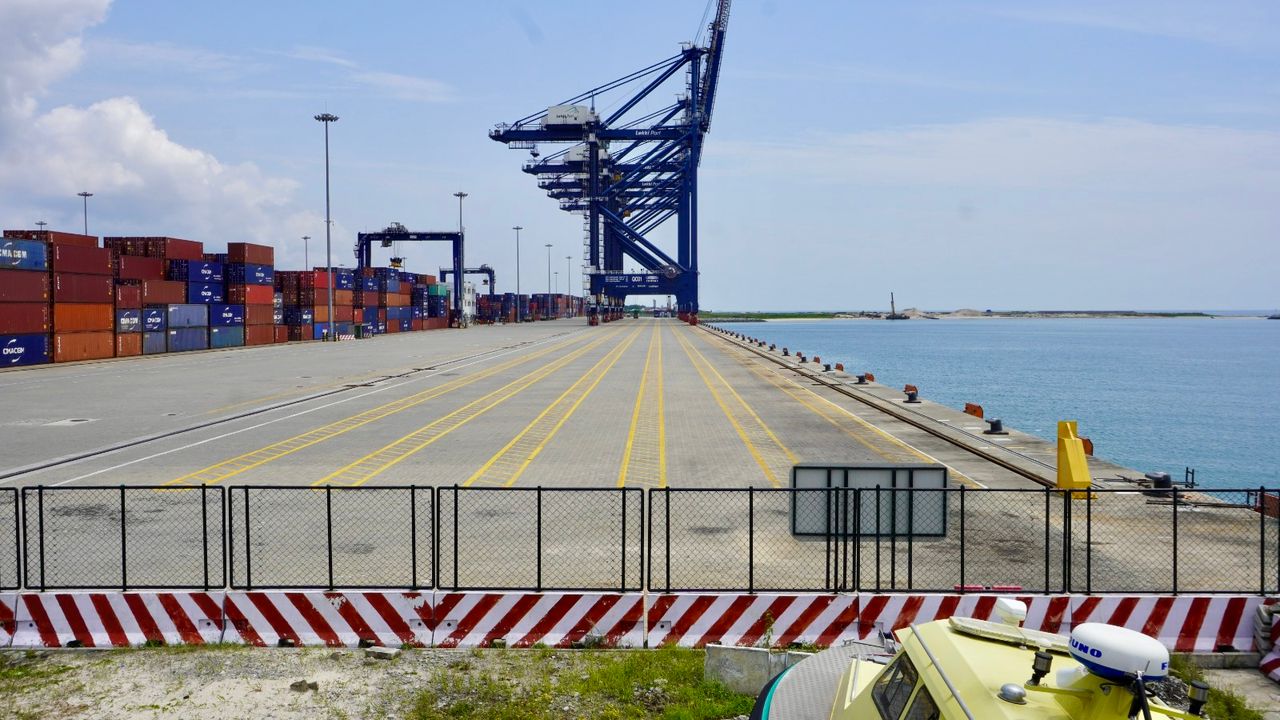By Sarafina Christopher, News Agency of Nigeria (NAN)
On the eastern edge of Lagos State, where the Atlantic wind sweeps across the Ibeju-Lekki peninsula, a quiet revolution is unfolding.
The Lekki Deep Sea Port, Nigeria’s first deep-water harbour, has evolved into a strategic maritime gateway, reshaping the logistics landscape of West Africa and opening new corridors for trade and industrial ambition across the continent.
For decades, the region watched a large portion of Nigeria’s maritime fortunes drain towards neighbouring ports in Lomé, Tema and Abidjan.
The lack of a deep draft has posed a challenge in accommodating modern ships; Lekki is rewriting that story.
With a 16.5-metre draft the deepest in West Africa, the port is among the few in the region capable of welcoming the world’s largest container vessels.
The Port has a 9.6km approach channel, 680m quay length, with a breakwater of 2km for the Phase 1 operations.
Upon expansion to Phase 2, the quay way will be extended to 1,500m and depth will be 19.5m.
The port facility includes three container berths, three liquid bulk berths and one dry bulk berth.
Lekki Freeport Terminal, a subsidiary of the global CMA CGM, operates the container terminal under a sub-concession arrangement.
The dry bulk and liquid terminal operations are in view.
From January to August, the port recorded 88,432 TEU imports, 123,013 TEU exports, 62,581 TEU transshipment moves, 16,925 TEU restows, and 34,710 TEU barge movements.
Transshipment already represents 38 per cent of total activity, signalling the port’s growing hub status.
The landmark arrival of CMA CGM Rimbaud on June 29, 2023 marked Nigeria’s first official transshipment call.
Lekki Port’s technological design integrates automated gates, OCR systems, ship-to-shore cranes, rubber tyred gantry cranes, FS 6000 drive through scanners, truck parks, and advanced control systems.
Its berth productivity averages 18 to 20 moves per hour, with truck turnaround time at approximately 45 minutes and container dwell time at 12 to 13 days.
Speaking during a recent round table with newsmen and stakeholders, Mr Wang Qiang, Managing Director, Lekki Port, said that the rise of Lekki was altering the maritime map of Africa.
“Lekki Port is becoming a gateway not only for Nigeria but for West and Central Africa.
“Our vision is to make trade faster, easier, and more competitive for businesses across the continent.”
He also added that investments in the port were driven by the need to address Nigeria’s long-standing infrastructure deficit and strengthen global competitiveness.
“When we saw this project and realised its value, we decided to invest and bring partners together.
“It is a project that shows what global collaboration can achieve,” he said.
Wang added that the port has “broken all records” and proven its transformational potential.
Standing before an all-encompassing view of towering ship to shore cranes, Mr Yang Xixiong, Chief Operations Officer, said the numbers told a compelling story.
“We have processed hundreds of thousands of TEUs within months, with close to 20 percent coming from transshipment cargo.
“This shows trust from the global shipping community and confirms Lekki as a regional distribution hub.
“The port’s location inside the Lagos Free Zone gives it a unique operational advantage, enabling seamless industrial integration where cargo can move straight from vessel to warehouse or factory floor with minimal bureaucracy,” he said.
In a technical briefing, Mr Mattew Oloyede, Head of Technical at Lekki Port, described the shift in regional competitiveness.
“This Port is helping Nigeria recover cargo traffic once lost to neighbouring countries.
“Our facilities are built to global standards, and we are expanding capacity because we see tremendous demand,” he said.
Nigeria’s broader economic ambitions have also found an anchor here.
Policy analysts say with the government seeking to diversify from oil into non-oil exports, the port is opening channels for manufacturers, agro-processors and logistics operators to reach global markets faster and cheaper.
The nation’s maritime regulator is equally convinced of Lekki’s transformational impact.
Lekki Port Manager, Nigerian Ports Authority (NPA), Mr Emmanuel Anda, said the port had recalibrated West Africa’s maritime geography.
“For the first time, Nigeria is handling ultra-large vessels efficiently; Lekki is deepening Nigeria’s presence on global shipping routes and strengthening our maritime competitiveness.’’
He said that the port was significantly boosting export activity, helping Nigeria approach a healthier balance of trade.
He said that continued progression could see Lekki become a global export hub within 10 to 15 years.
“This is what happens when you partner with the right people,”Anda said.
Also, Mr Muazzamu Ibrahim, Traffic Manager, NPA, highlighted operational efficiency.
“Turnaround time here is significantly reduced; this efficiency saves money, improves predictability, and boosts confidence among shipping lines,” he said.
According to Harbour Master, Captain Tunde Ayoola, operational safety is also a point of pride; the port’s navigation systems are built to international standards.
“Our channels, turning basins and marine procedures are designed to handle large vessels safely.
“It is a new horizon for Nigerian maritime operations,” he said.
More so, Prof. Akanbi Ilupeju, Dean, Faculty of Arts, University of Lagos, praised the project’s knowledge-building partnerships.
“Lekki Port is helping build Nigerian maritime talent.
“It is an academic-industry corridor where young professionals can develop expertise that matches global standards,” he said.
Dr Fatai Asodun, Sub-Dean, said the ripple effects would strengthen the economy for decades.
“Ports are catalysts of national development; what is happening in Lekki will not only empower workers but shape entire value chains,” he said.
For the host community, the benefits are real.
Community representative, Mr Adesanya Adeshina, acknowledged progress in jobs and corporate social responsibility.
“We have seen young people gain meaningful jobs and training opportunities.
“The port’s community engagement is growing, and this is encouraging,” he said.
Downstream, the Lekki Freeport Terminal is driving commercial expansion.
According to Mr Kehinde Olubi-Neye, Chief Commercial Officer, the facility is redefining African logistics and since commercial operations began in 2023 with one shipping line, the port now accommodates five major lines with multiple routes.
He added that the port was still in its first phase and there would be further developments for the operation of the liquid and bulk terminals.
“The location gives us direct access to the hinterland and supports the Federal Government’s export agenda; this is the future.”
He also said that Lekki was becoming a preferred hub for West and Central Africa.
“By reducing shipping time and cost, we are enabling manufacturers and businesses to compete globally,’’ he said.
From a carrier perspective, Ms Mary Ebechukwu of COSCO Shipping Line, said that the depth, speed and professionalism at the port were impressive.
For global operators like us, Lekki is a strategic advantage across African trade corridors.”
It is worthy of note that the port’s development was made possible through a 45-year Build, Own, Operate and Transfer (BOOT) model from NPA.
Its shareholders include Lekki Port Investment Holding Inc (comprising China Harbour Engineering Company Ltd.,Tolaram) and the Lagos State Government and the NPA.
Road infrastructure upgrades are ongoing, and the planned Lagos Green Line rail connection will significantly boost cargo evacuation and accessibility.
In the wider West African theatre, where the African Continental Free Trade Area (AfCFTA) is opening unprecedented opportunities, Lekki Deep Sea Port offers something rare: scale, speed and unmatched efficiency.
Amid capacity constraints in neighbouring countries, and rising demand for deep-water logistics, Lekki gives Africa a competitive edge.
On an ordinary day, containers rise like a new skyline, cranes swing rhythmically over the quayside, and massive ships glide into position.
But beneath the mechanical precision is something more profound: a new economic centre is being born on the Nigerian coastline.
Mrs Adesuwa Ladoja, Managing Director of Lagos Free Zone, provided an insight.
“Lekki Port is more than infrastructure. It is an engine for African industrialisation,” she said.
Media representatives present emphasised the importance of accurately reflecting the transformation taking place in Nigeria’s maritime sector, noting that many Nigerians are unaware of Lekki’s scale and operations.
“We are here to change the narrative and let Nigerians and investors know what we have,” a journalist added.
Observers say corporate social responsibility programmes are also central to development.
The port supports youth skills training; beach clean-up initiatives, malaria prevention schemes, academic collaboration with the University of Lagos, and cultural exchange programmes.
A China-Africa documentary titled Port of Openness: A Gateway to China-Africa Prosperity is set for broadcast at the G20 Summit in South Africa in November, highlighting the port’s significance.
As of October, Lekki Port has 760 members of staff 98 per cent of whom are Nigerians and has cumulatively trained more than 5,000 local workers since construction began in 2020.
The Minister of Blue and Marine Economy, Mr AdegboyegaOyetola, said that the Federal Government estimated more than 170,000 direct and indirect jobs over the 45 year concession period and revenue contributions of 158 billion dollars, alongside 361 billion dollars in GDP impact from the project.
He also stressed that the Federal Government remained committed to taking the lessons of Lekki Port and applying them nationwide to transform the entire port system into a network of modern, efficient, and competitive gateways.
Ultimately, analysts hold that the Lekki Deep Sea Port, with its modern infrastructure and capacity to handle large vessels, has the potential to transform Nigeria and Africa’s economy through job creation, revenue generation, among others.
They say the port has the capacity to position Nigeria as a more competitive player in global trade. (NANFeatures)












